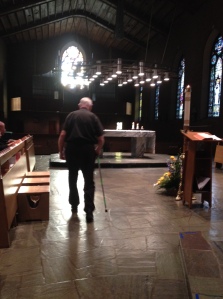
In, “Wow, he never ceases to amaze” news, Pope Francis just dropped a Petrine hammer on his own inner circle. The Vatican Curia – the upper echelon leaders of the vast Vatican administrative machine – got some coal in their mitres during what is usually a pretty benign Christmas address. The short version: he said the Curia was sick. Of the 15 ‘ailments’ he named that are harming the life of the Roman Catholic Church, I thought a few especially applied to my own communion, the United Methodist Church. The full list, and the original numbering, is found here from the AP, from which the following selections are quoted. The commentary attached is my own. See if you think the Holy Father’s words are fitting for today’s UMC:
1) Feeling immortal, immune or indispensable. “A Curia that doesn’t criticize itself, that doesn’t update itself, that doesn’t seek to improve itself is a sick body.”
Going on to perfection is kind of our thing, isn’t it? In 2012, the UMC showed a remarkable ability to avoid self-improvement. How can we become a healthy body instead of a sick body?
2) Working too hard. “Rest for those who have done their work is necessary, good and should be taken seriously.”
For too many Christians, lay and clergy alike, busyness has become a status symbol and an idol. Why don’t our clergy preach sabbath? Why don’t our churches expect it of their pastors?
5) Working without coordination, like an orchestra that produces noise. “When the foot tells the hand, ‘I don’t need you’ or the hand tells the head ‘I’m in charge.'”
It is easy to look upon other corners of the church as backwards, our out there, or fruitless, or whatever. But we are all in this together, folks. (By the by, Bishop Grant Hagiya recently had some great things to say about the Pacifict-Northwest, often dismissed by Methodists here in the Bible Belt, on episode #7 of the WesleyCast). Moreover, coordination – aligning our ministries, resources, and energies – is critical to accomplishing our ministry. See also #1.
6) Having ‘spiritual Alzheimer’s.’ “We see it in the people who have forgotten their encounter with the Lord … in those who depend completely on their here and now, on their passions, whims and manias, in those who build walls around themselves and becomes enslaved to the idols that they have built with their own hands.”
Ask about rescinding the Guaranteed Appointment and watch our clergy suddenly develop ‘spiritual Alzheimer’s.’
7) Being rivals or boastful. “When one’s appearance, the color of one’s vestments or honorific titles become the primary objective of life.”
We are too damned competitive with each other. The megachurch pastors all want the number one spot. The mid-size church in town competes with the large downtown church. On a charge, the smaller church or churches feel inferior to the larger. Clergy boast about “God’s work” in their church, sharing posts on social media about all the amazing things going on but really we just want our colleagues and superiors to think better of us. In internet parlance, this is called a “humblebrag.” All of this is poison. Pure poison.
9) Committing the ‘terrorism of gossip.’ “It’s the sickness of cowardly people who, not having the courage to speak directly, talk behind people’s backs.”
Christians should not be gossips, and we in the UMC are as guilty as anyone. We talk behind the backs of our pastors, our lay leadership, our bishops, etc.. We of all people know the power of words to make and unmake lives, galaxies, families, and churches. Clergy should take the lead in condemning gossip in all its forms. Dave Ramsey’s (I know, I know) take is helpful. If you think Ramsey is too strong on this, remember – the Pope just called this terrorism.
12) Having a ‘funeral face.’ “In reality, theatrical severity and sterile pessimism are often symptoms of fear and insecurity. The apostle must be polite, serene, enthusiastic and happy and transmit joy wherever he goes.”
The subtext for too many of our denominational gatherings – international, national, and local – is death. We Methodists wear the funeral face well. We shouldn’t. As another Bishop of Rome, John Paul II, said, “We are Easter people and hallelujah is our song.”
14) Forming ‘closed circles’ that seek to be stronger than the whole. “This sickness always starts with good intentions but as time goes by, it enslaves its members by becoming a cancer that threatens the harmony of the body and causes so much bad — scandals — especially to our younger brothers.”
If all or most of your friends are on the same side as you, in the church or in the world – you need to rid yourself of this sickness. Caucuses (such as the IRD, RMN, Good News, and Love Prevails) have done the UMC precisely what some of the Founders – quite correctly – warned that parties would do the the US. If you want to affiliate with some sub-group of the UMC, fine; but we are contributing to the dissolution of the church and our own spiritual myopia if we only associate with like-minded folk.
—
There’s my annotated, partial list of Pope Francis’ recommendations for United Methodists. What do you think? What should be added? Might the UMC benefit from a similar speech from one of our Bishops?








